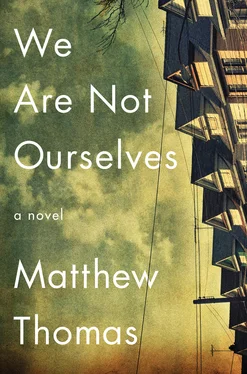“This is nice,” Connell said.
“This campus was designed by a famous architect named Stanford White,” his father said automatically. “At one time, it was the Bronx satellite of New York University.” His voice sounded distant, as though he were delivering a lecture. “When NYU built this campus, their chancellor said he wanted it to look like the American ideal of a college. In the early seventies, after it had gotten too expensive to maintain, NYU sold it to the State of New York, and we moved over here from the old Bronx High School of Science.”
“Dad,” he said.
“Yes?”
“Are we late?”
“No.”
“Then why are we running?”
Something in his voice must have given his father pause, because his father stopped and put a hand on his shoulder.
“This isn’t how I would have wanted this to go,” he said. “Believe me. There’s a lot here I wanted to show you. There’s a beautiful overlook point called…” He rubbed his nose. “The Hall of Fame for Great Americans,” he said after a few seconds. “You can see for miles up there. It has a lot of statues arranged in a circle around you. Maybe if everything goes well I can take you there after class.”
They arrived at the building, but instead of marching directly into the lecture hall to a throng of expectant students, as his father’s pace suggested they might have to do, they headed to his lab, where he closed the door behind him. His father told him to absorb himself in whatever he might find interesting, so long as he didn’t break anything. He waved at a human skeleton suspended in the corner, a row of rat cages along the far wall, and a lonely assemblage of beakers and petri dishes. Then he took out his legal pad and paced back and forth, quietly reading aloud.
Connell left the beakers huddled in their fragile little gathering. He avoided the accusing eyes of the rats and hurried past the hollow ones of the skeleton. Finding nothing more promising, he circled back to tap on the glass of the rat cages and listen to what his father was reading.
“You can feed them if you want,” his father said, gesturing to the rats, which almost seemed to listen along over his shoulder. “There’s a bag of pellets in the drawer behind you.”
“I’m okay,” Connell said.
“I’m trying to focus,” his father said, “and it would help if I didn’t have to worry about you listening to every word.”
His father searched around. “Here, take this,” he said, tossing him an issue of Scientific American . Connell didn’t like that magazine; they had a lot of them at home. His father was always drawing his attention to articles on black holes or glaciers or acid rain, but Connell stuck to Sports Illustrated and the “People” page in the back of Time .
“Why don’t you sit outside and I’ll come get you when I’m done?”
Connell wanted to tell him he didn’t have to come to his stupid class at all if he wanted him gone that badly, but he held back. He did have to write the report. But something else told him not to make a big deal of it. “I’ll just go to the class and wait for you,” he said.
“Great,” his father said, visibly relieved. “Two flights up. Room four forty-three. Introduce yourself.”
As Connell left, his father was splashing water on his face in one of the sinks at the end of the long tables.
He took the stairs three at a time. The classroom door was open; he walked past it as casually as he could. The room was more full than he’d expected. How was he supposed to introduce himself to a room full of college students? He could barely get up in front of kids his own age without worrying about his voice betraying him with squeaks and squawks.
He mimed absorption in a bulletin board, then doubled back, passing the room again. The floor sloped upward from the front, so that the people at the back stared down from a lofty perch. A box on the wall taunted him: In Case of Emergency, Break Glass. The words took on a sudden poignancy; he would’ve been helpless even with an axe in his hand. He was beginning to see the wisdom in his father’s having prepared a speech.
He stepped into the room and hustled to one of the empty seats in the back. He waited for the thumping in his chest to subside. They could figure out who he was for themselves if they cared so much.
When his father walked in, he didn’t look up but headed for the podium and started reading from his pad.
“Today we are going to begin our discussion of the central nervous system,” he said. “I have quite a bit of material to cover, and it is crucial that you assimilate this material for the final exam, so I would ask you to take careful notes, because I will not be able to repeat myself or interrupt the lecture to answer questions. Should you happen to find yourself confused at any point, please write your questions on a sheet of paper to hand to me at the end of class, and I will provide you with a written response when we meet on Thursday. Additionally, I am sorry to report that, due to the demands of a long-term research project, I will be forced to cancel office hours for the remainder of the semester.”
The room erupted in incredulous groans. His father didn’t look up but only held his finger on the page and waited for the furor to die down.
“At the end of each remaining class session, I will collect your questions. After I do so, I will pass out the detailed responses I have written to your earlier questions. Writing these responses will come at the expense of a considerable amount of my time, so I hope you will rest assured that any lost office hours will be more than adequately compensated for in this fashion. If on occasion I appear sluggish or distracted, or seem to need a second to compose myself, be aware that I am likely exhausted from the busy schedule I am keeping.
“One other point of note. Beginning today, I will be reading exclusively from prepared lectures and leave off answering or posing questions. In recent class sessions, we have covered comparatively less material than we did in the earlier part of the course, as you are all no doubt aware.”
There were murmurs of acknowledgment, though his father didn’t stop to notice them.
“I ask your forgiveness for the relatively inert nature of my presentation of the material from now on, but I assure you that a certain briskness is vital to your being adequately prepared for the final examination. And so, without further ado, I would like to begin.”
When his father walked in, an indignant chatter had percolated throughout the room. At the beginning of his speech, a few students scanned the room for the reactions of others, but now several who didn’t have notebooks out before took them out, and many pens were poised over pages.
He began.
“The central nervous system,” he said, “represents the largest part of the nervous system. It consists of the brain and the spinal cord. Along with the peripheral nervous system, which we will learn about later, the central nervous system plays an essential role in the control of behavior.”
All around Connell, people were writing down everything he said.
“The central nervous system is contained within an area known as the dorsal cavity, which can be broken down into two subcavities, the cranial and the spinal. The cranial cavity contains the brain, while the spinal cavity contains the spinal cord.”
A few hands went up; it was evidently a hard habit to break immediately. If his father saw them out of the corner of his eye, he didn’t give any indication. He flipped pages in his pad as he read.
“The central nervous system is protected by an elegant, two-tiered system. First, both the brain and the spinal cord are enveloped in a sheath of membranes known as the meninges. The meninges are three continuous sheets of connective tissue. From the outside in, these sheets are known as the dura mater, the arachnoid mater, and the pia mater.”
Читать дальше
Конец ознакомительного отрывка
Купить книгу












